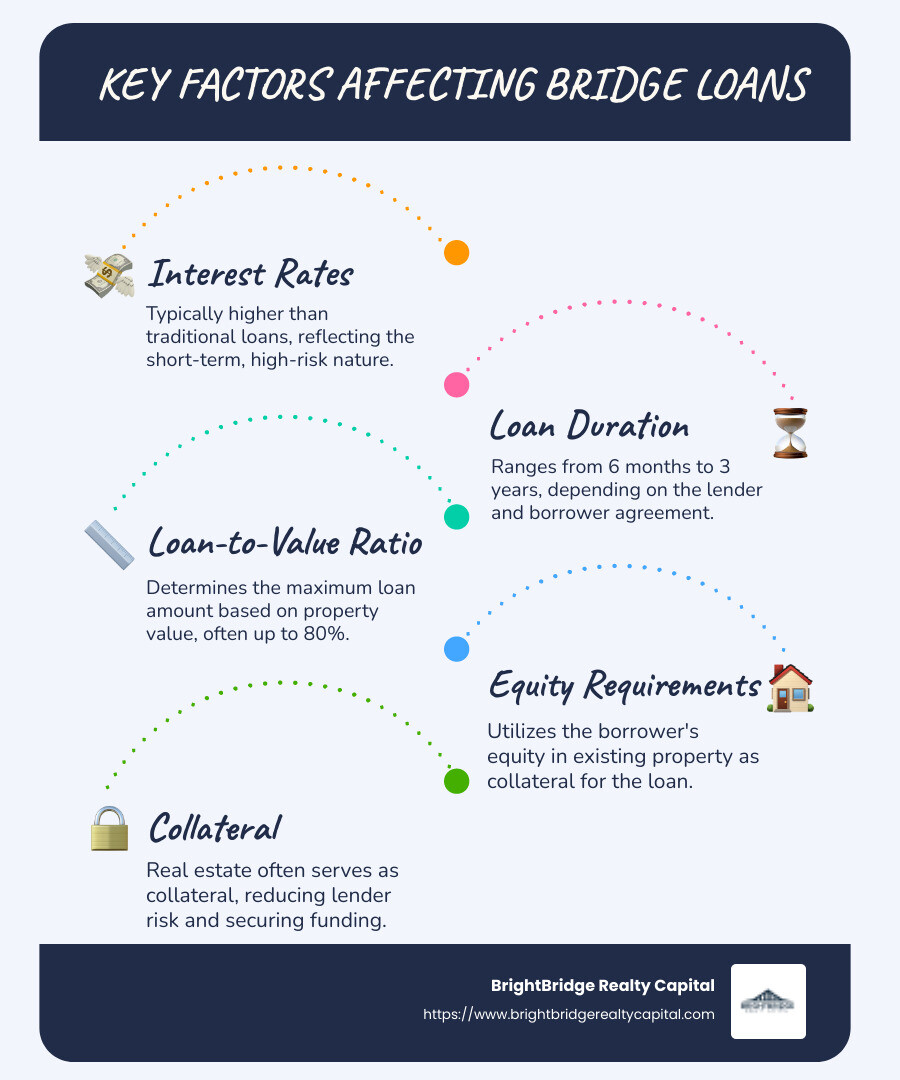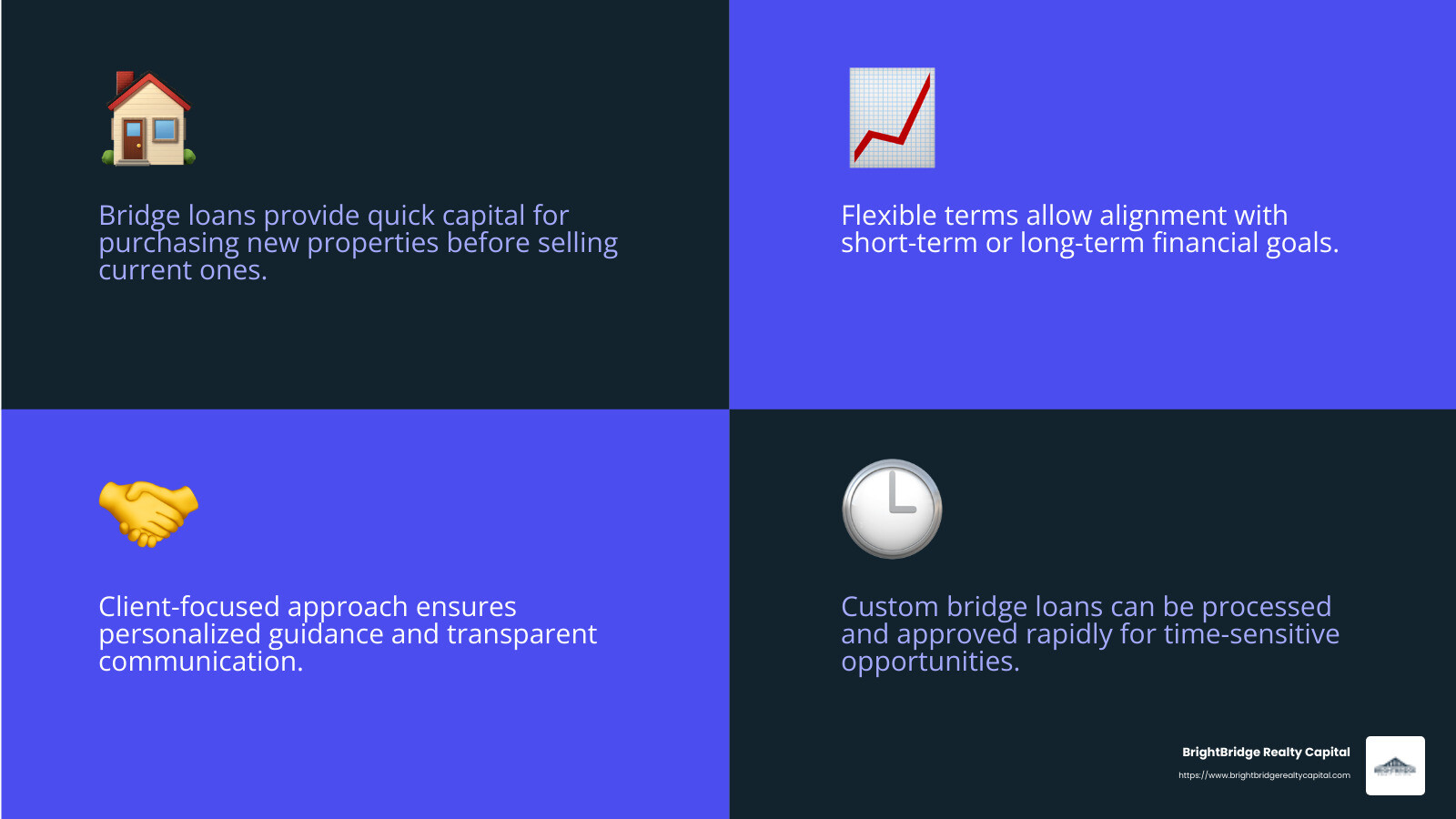Bridge Loans in Real Estate: What You Need to Know

Bridge loan real estate serves as a crucial financing tool for real estate investors needing swift, short-term funding. These loans seamlessly bridge the financial gap between selling an existing property and buying a new one – often a critical requirement in fast-moving markets. Quick Snapshot:
- Purpose: Interim cash flow until long-term financing is secured
- Duration: Typically 6 months to 3 years
- Interest Rates: Higher than traditional loans
- Use Case: Buying residential or commercial properties quickly
In the world of real estate investment, timing can be everything. Bridge loans allow investors to act quickly, whether they are flipping properties or expanding rental portfolios. Bridge loans are all about speed and flexibility, providing immediate access to cash while awaiting more permanent financing solutions.
John Hofmann from JPMorganChase highlights the significance of bridge financing: “A lot of times, that includes bridge financing.” The flexibility bridge loans offer can mean the difference between securing or missing out on lucrative investment opportunities.
By understanding the real estate bridge loan's mechanics, investors can position themselves to capitalize on property deals without the cumbersome wait often associated with traditional lending processes.

Understanding Bridge Loans
How Bridge Loans Work
Bridge loans are short-term financing solutions designed to fill the gap between buying a new property and selling an existing one. They are especially useful in the real estate market where timing is crucial. Here's how they work:
Short-Term Loan: Bridge loans typically have a term ranging from 6 months to 3 years. They provide immediate cash flow to cover the down payment or purchase of a new property while waiting for the sale of the current one.
Financing Bridge: These loans act as a bridge, providing interim financing until long-term financing is secured or an existing obligation is fulfilled. This helps maintain liquidity and flexibility for homeowners and investors alike.
Equity Utilization: Borrowers often use the equity in their current home as collateral for a bridge loan. This means they can leverage the value of their existing property to secure financing for their next purchase.

Gap Financing: Also known as gap financing, bridge loans are crucial during transitional periods. They allow borrowers to proceed with new purchases without having to wait for the sale of their existing property, which can be a lengthy process.
Interim Financing: Bridge loans are a form of interim financing, providing temporary funds to bridge the gap until more permanent financing is available. This is particularly beneficial in competitive real estate markets where quick action is necessary.
Collateral Requirements: Most bridge loans require collateral, typically the borrower's current home. This reduces the lender's risk and allows for quicker approval and funding processes.
Quick Approval and Funding: One of the main advantages of bridge loans is their fast approval and funding process. This speed is crucial for real estate investors who need to act quickly to secure properties.
In summary, bridge loans offer a strategic advantage for those in the real estate market, providing the necessary funds to move quickly on new opportunities while managing existing financial obligations.
Bridge Loan Real Estate: Key Considerations
Pros and Cons of Bridge Loans
When considering a bridge loan in real estate, it's important to weigh the pros and cons. These loans can be a powerful tool for those needing quick access to funds, but they come with their own set of challenges.
Pros:
Quick Financing: Bridge loans offer rapid access to cash, often within two to three weeks. This speed can be crucial when you need to secure a new property in a hot market.
No Contingency Needed: With a bridge loan, you can make an offer on a new home without making it contingent on the sale of your old home. This can make your offer more attractive to sellers.
Cons:
High Interest Rates: One of the significant downsides is the higher interest rates compared to traditional loans. This can increase the overall cost of borrowing.
Equity Requirements: Many lenders require at least 20% equity in your current home. This can be a barrier if you haven't built up enough equity.
Dual Mortgage Payments: If your current home doesn't sell quickly, you could end up making payments on both your old and new mortgages. This can strain your finances.
Loan-to-Value Ratio: Most bridge loans allow borrowing up to 80% of the combined value of your current and new home. If your existing mortgage balance is high, this might not leave enough for a down payment on the new property.
While bridge loans can provide the quick financing needed to secure a new property, they come with higher costs and risks. It's crucial to assess your financial situation and the real estate market conditions before proceeding with a bridge loan.
How to Qualify for a Bridge Loan
Application Process
Qualifying for a bridge loan in real estate involves meeting specific criteria set by lenders. Here’s what you need to know to steer the application process smoothly.
Credit Score
Your credit score is a critical factor. Most lenders prefer a high credit score, often 740 or above, to approve a bridge loan. A strong credit score demonstrates your reliability as a borrower and can influence the interest rate you receive.
Debt-to-Income Ratio
Lenders will evaluate your debt-to-income (DTI) ratio. This metric shows the percentage of your income that goes toward debt payments. A DTI below 50% is typically preferred, as it indicates you have enough income to cover additional loan payments.
Lender Requirements
Each lender has unique requirements, but common ones include:
- Equity: You usually need at least 20% equity in your current home.
- Loan-to-Value (LTV) Ratio: This ratio should generally not exceed 80% for bridge loans.
- Income Verification: Proof of steady income to demonstrate your ability to repay the loan.
Fast Approval
One of the benefits of bridge loans is the potential for fast approval. Many lenders offer rapid processing, sometimes within a week. This speed can be advantageous if you need to act quickly in a competitive real estate market.
Documentation
Be prepared to provide comprehensive documentation:
- Proof of Income: Pay stubs, tax returns, or other income verification.
- Credit Report: A detailed credit history.
- Property Appraisal: An appraisal of your current home to establish its value.
- Existing Mortgage Details: Information about your current mortgage, including balance and terms.
Lender Evaluation
Lenders will conduct a thorough evaluation of your financial situation. This includes assessing your creditworthiness, verifying your income, and calculating your DTI ratio. They will also consider your home’s equity and the LTV ratio to ensure you meet their criteria.
In summary, while qualifying for a bridge loan involves meeting several financial criteria, the process can be expedited with the right preparation. By understanding the requirements and having the necessary documentation ready, you can increase your chances of securing a bridge loan quickly.
Next, we'll explore the customized financing solutions offered by BrightBridge Realty Capital, which can provide custom options to meet your unique needs in the real estate market.
Customized Financing Solutions by BrightBridge Realty Capital
At BrightBridge Realty Capital, we understand that every real estate transaction is unique. That's why we offer custom bridge loans custom to fit your specific needs. Whether you're buying a new home before selling your current one or need quick capital for an investment, our solutions are designed with flexibility and client focus at their core.
Flexible Terms
Our bridge loans come with flexible terms to accommodate your financial situation. Unlike traditional loans, which often have rigid structures, our terms can be adjusted to align with your short-term or long-term goals. This flexibility ensures that you have the breathing room you need to make strategic decisions without the pressure of inflexible payment schedules.
Client-Focused Approach
We pride ourselves on a client-focused approach. Our team works closely with you to understand your unique circumstances and objectives. We believe in transparent communication and personalized service, ensuring that you are informed and comfortable at every step of the process. This means no surprises—just clear, straightforward guidance to help you achieve your real estate goals.
Custom Bridge Loans for Every Need
Whether you're a homeowner looking to buy a new property before selling your existing one, or an investor seeking to capitalize on a time-sensitive opportunity, our custom bridge loans can provide the capital you need quickly. Our team is equipped to handle complex transactions with ease, offering you the peace of mind that comes with knowing you're supported by experts.

The BrightBridge Advantage
Choosing BrightBridge Realty Capital means choosing a partner committed to your success. Our nationwide lending capabilities ensure that no matter where your real estate ventures take you, we have the expertise and resources to support you. Plus, our faster closings mean you won't miss out on critical opportunities due to slow financing.
In the next section, we'll address some frequently asked questions about bridge loans to further clarify how they can benefit you in various scenarios. Stay tuned to learn more about how bridge loans can fit into your real estate strategy.
Frequently Asked Questions about Bridge Loans
What is the typical duration of a bridge loan?
Bridge loans are designed to be short-term solutions. They typically last from 6 months to 1 year. However, some can extend up to 3 years, depending on the lender and the borrower's needs. This duration is meant to provide a temporary financial bridge until you can secure more permanent financing or sell your existing property.
How does a bridge loan affect my existing mortgage?
When you take out a bridge loan, it can either add to your existing debt or pay off your current mortgage. If you choose to use it as a second mortgage, you'll have to make payments on both your original mortgage and the bridge loan. This can increase your overall monthly expenses. Alternatively, some borrowers use the bridge loan to pay off their existing mortgage, which can simplify your financial commitments but still requires careful management to avoid financial strain.
Can businesses use bridge loans?
Yes, businesses can also benefit from bridge loans. These loans are not limited to residential real estate transactions. Many companies use bridge loans to cover expenses while waiting for longer-term financing. For instance, businesses might need quick capital to seize an investment opportunity, renovate a property, or manage cash flow during transitional periods. The flexibility and speed of bridge loans make them a valuable tool for both individuals and businesses navigating the real estate market.
Conclusion
In the world of real estate, bridge loans offer a lifeline, providing quick and flexible financing solutions when timing is crucial. At BrightBridge Realty Capital, we understand the importance of speed and customization in real estate transactions. That's why we specialize in offering customized financing solutions custom to meet your unique needs.
Our approach is simple: we cut out intermediaries to offer direct lending with competitive rates. This not only ensures that you get the best deal possible but also speeds up the process significantly. We pride ourselves on our ability to close deals quickly, often within a week. This rapid turnaround can make all the difference when you're trying to secure a new property or manage cash flow during a transitional period.
Whether you're an investor looking to flip a property, a business needing interim financing, or a homeowner in transition, BrightBridge Realty Capital is here to support you with a seamless, stress-free experience. Our team of experts is dedicated to guiding you through every step of the process, ensuring that your financial goals are met with efficiency and ease.
Ready to explore how our bridge loan solutions can work for you? Find more about our services and get started today!
With BrightBridge Realty Capital, you're not just getting a loan—you're gaining a partner in your real estate journey.


